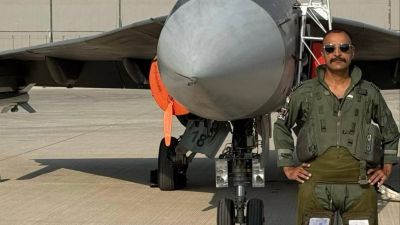Shortly after the 9/11 attacks in the US in 2001, a high-level delegation, deputed by the US President, came to India with a request that it join its war on terror in Afghanistan. At a meeting of the Cabinet Committee on Security (CCS), External Affairs Minister Jaswant Singh was all for India joining Operation Enduring Freedom. But the three chiefs of the Indian armed forces did not want to get involved. After listening to all, Prime Minister Atal Bihari Vajpayee said: “Isko thoda aur sochna padega” (this may need more thought).
Known for his one-liners, some of which disarmed his political rivals and some created history, Vajpayee’s remark put an end to weeks of negotiations and dialogue between New Delhi and Washington over a united war on terror.

Admiral Sushil Kumar, who was Navy chief between December 1998 and December 2001, offers this glimpse into Vajpayee’s way of handling issues in his book A Prime Minister To Remember: Memories of a Military Chief, published by Konark Publishers Pvt Ltd.
According to Kumar, Admiral Dennis Blair, Commander-in-Chief of the US Pacific Command (now known as US Indo-Pacific Command) had led a large entourage to India with several high-ranking US military officers. Blair told Kumar that the delegation was personally deputed by the US President because the “US government was keen on India’s support for its war on terror” and that a separate delegation headed by Strobe Talbott, former US Deputy Secretary of State, was in dialogue with Indian officials including Jaswant Singh and NSA Brajesh Mishra.
 ‘Vajpayee “noticed my look of disapproval” and said “Hamare Admiral khush nahin hai”’.
‘Vajpayee “noticed my look of disapproval” and said “Hamare Admiral khush nahin hai”’.
Making a presentation on Enduring Freedom, the delegation proposed tasks for the Indian Navy including underway replenishment at sea and combat-related support for US carrier battle groups while the IAF was to make its air bases available for staging long-range US aircraft, and the Army was to prepare for induction of troops in Afghanistan for ground operations.
But the three chiefs — General S Padmanabhan, Air Chief Chief Marshal A Y Tipnis and Admiral Kumar — unanimously decided to advise the government against it. “Neither was this a United Nations operation, nor was India at war with Afghanistan. Moreover, with its policy of non-alignment, India had never been part of a military pact or alliance,” Admiral Kumar writes in the book.
At the CCS meeting, Jaswant Singh “waxed eloquent on the need to join this operation as it was part of a global war on terror and could garner international support” and “the opportunity India had to engage with the US, the only super power.”
Story continues below this ad
 George Fernandes, Atal Bihari Vajpayee, Jaswant Singh, LK Advani and Surjeet Singh Barnala. (Express archive)
George Fernandes, Atal Bihari Vajpayee, Jaswant Singh, LK Advani and Surjeet Singh Barnala. (Express archive)
But according to Admiral Kumar, Vajpayee “noticed my look of disapproval” and said “Hamare Admiral khush nahin hai” (our Admiral is not happy). When he got the chance, the Admiral expressed his reservations and asked whether such a move would not appear as if India was at war with Afghanistan. When Vajpayee turned to Defence Minister George Fernandes, he responded: “Our military chiefs have said it all.”
“Prime Minister Vajpayee graciously put the matter to rest with a philosophical quip: ‘Isko thoda aur sochna padega’.”
In the book, Admiral Kumar mentions how Op Parakram, launched in the wake of the December 13, 2001 terror attack on Parliament House — had been conceived in mid-2000 to give a “punishing response” in the event of a Kargil-type misadventure by Pakistan. “It was planned as a deep-penetration slicing blow by Indian Army formations in a designated sector.”
After the Parliament attack, Fernandes and Mishra had a meeting with the three chiefs and the discussions that followed focussed on “delivering a swift riposte” on Pakistan Army training camp for terrorists across the LoC and deep inside PoK. But there was a last minute intelligence report that “the Pakistan Army terror camp which was to be targeted had been cleverly relocated to a nearby site, sandwiched between a school and a large hospital.” He said “the final decision of Prime Minister Vajpayee was to stand down” because of the prospective “unacceptable collateral damage”.
Story continues below this ad
 Former prime minister Atal Bihari Vajpayee with former defence minister George Fernandes. (Express Archive)
Former prime minister Atal Bihari Vajpayee with former defence minister George Fernandes. (Express Archive)
Although the three chiefs were directed to mobilise the armed forces for action, it was not for Op Parakram. Vajpayee then called General Padmanabhan and Admiral Kumar for a breakfast meeting during which it became apparent that he was “viewing the mobilisation of the three armed forces purely as a coercive strategy and nothing more”.
Incidentally, after the Balakot strike, the ruling BJP including ministers had launched an attack on the Manmohan Singh-led UPA government, saying that the IAF, in the wake of the 26/11 Mumbai terror attack, was ready to strike at strategic targets inside Pakistan, but the government did not give the green signal.

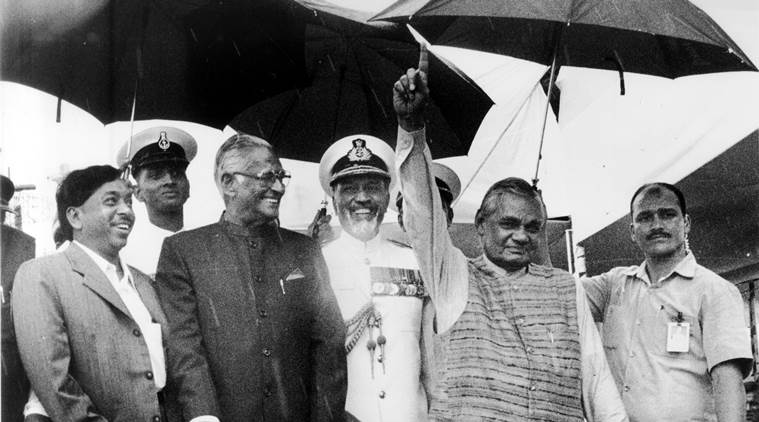 Atal Behari Vajpayee with Naval Chief Sushil Kumar, Governor PC Alexander and Maharashtra CM Narayan Rane at a funciton of INS Mysore. (Express Archive photo by Manoj Patil)
Atal Behari Vajpayee with Naval Chief Sushil Kumar, Governor PC Alexander and Maharashtra CM Narayan Rane at a funciton of INS Mysore. (Express Archive photo by Manoj Patil)
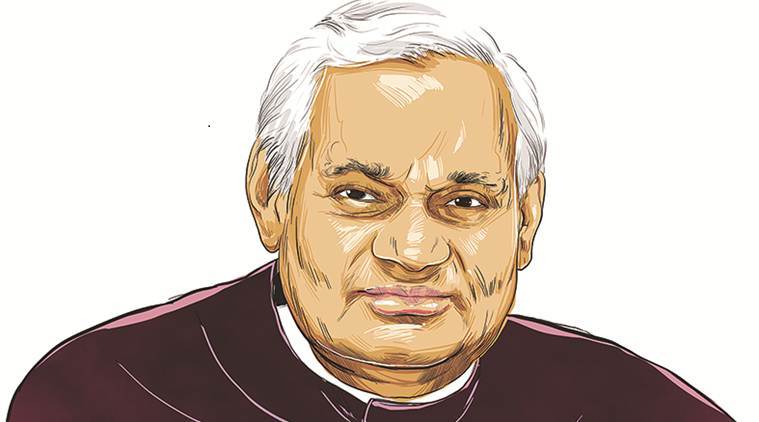 ‘Vajpayee “noticed my look of disapproval” and said “Hamare Admiral khush nahin hai”’.
‘Vajpayee “noticed my look of disapproval” and said “Hamare Admiral khush nahin hai”’.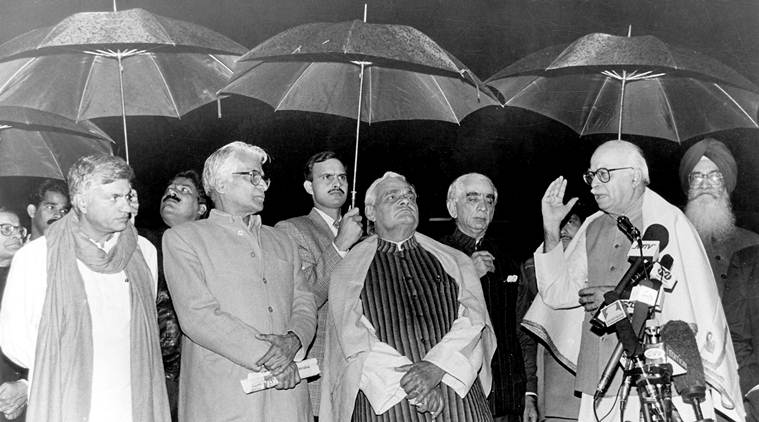
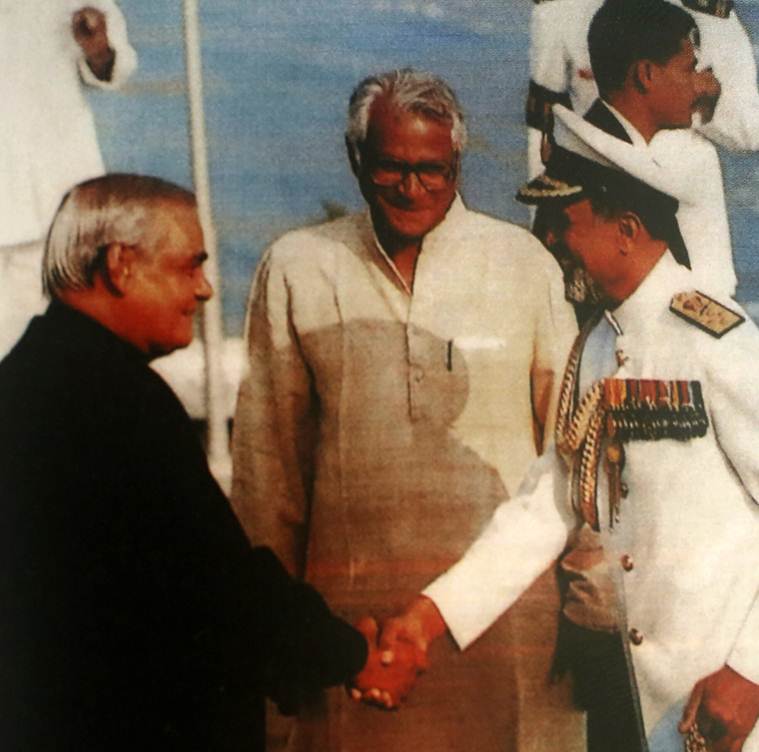 Former prime minister Atal Bihari Vajpayee with former defence minister George Fernandes. (Express Archive)
Former prime minister Atal Bihari Vajpayee with former defence minister George Fernandes. (Express Archive)





